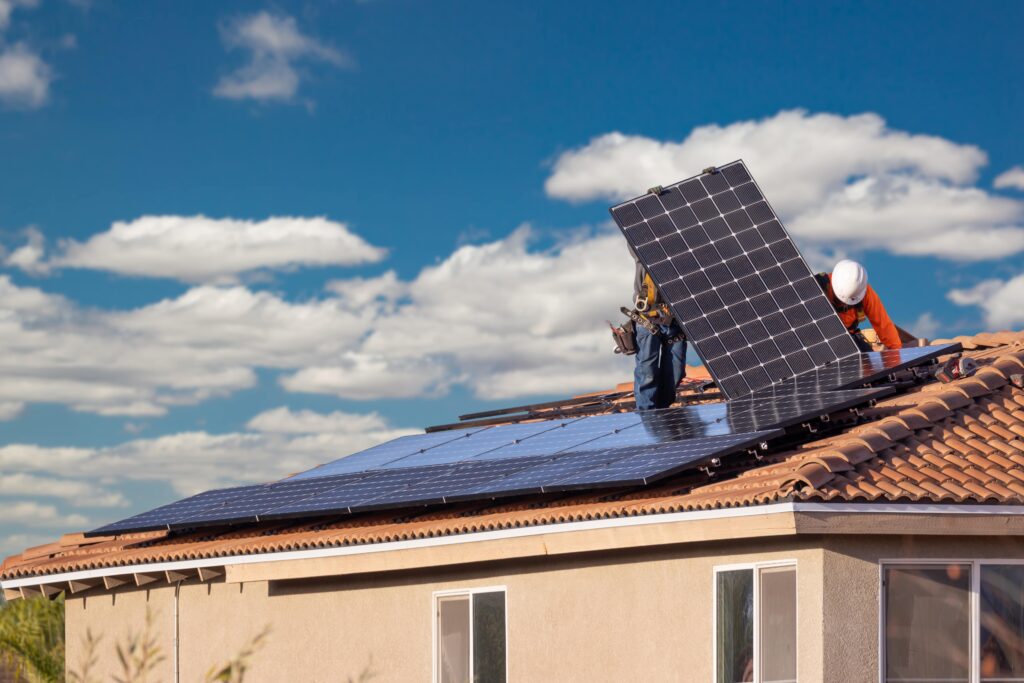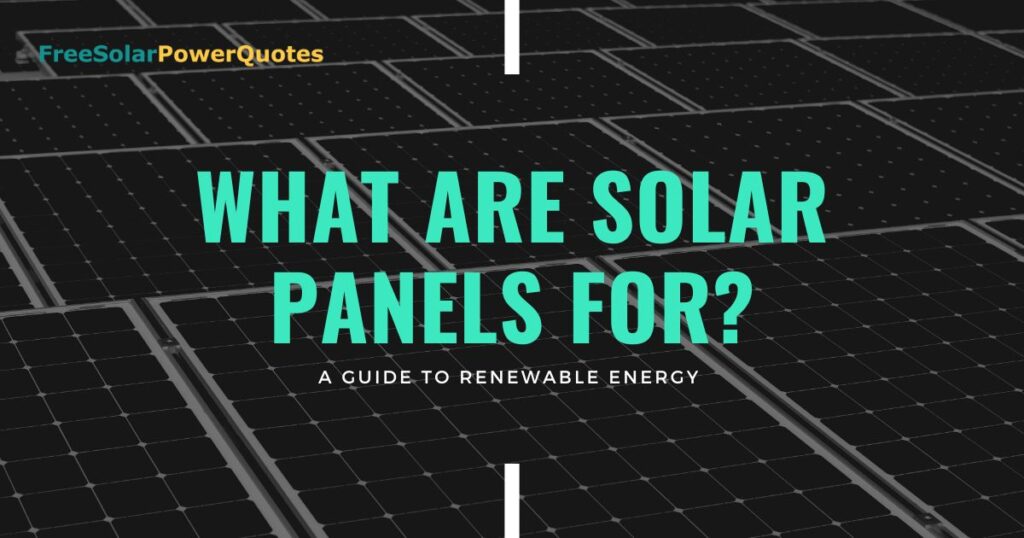Solar panels have become popular as more individuals aspire to live sustainably and decrease their carbon footprint. Solar panels are a great way to harness the sun’s power and use it to generate electricity for your home or business. In this guide, we’ll explore What are solar panels for, how they work, how you can choose the right ones for your needs, and even how you can finance them.
What Are Solar Panels For?
Solar panels are used to generate electricity. They work by capturing the energy from sunlight and converting it into electrical power through a process known as photovoltaics. The electricity generated by solar panels can be used to power homes, businesses, and other applications where electrical power is needed. Solar panels are important part of the transition towards renewable energy sources, as they provide a clean, reliable, and cost-effective source of electricity.
Understanding Solar Panels
Before you dive into the world of solar panels, it’s important to understand how they work. Photovoltaic (PV) cells are the building blocks of solar panels and are responsible for transforming sunlight into electricity. When sunlight hits the cells, it creates an electrical current that is then stored in a battery and can be used to power your home or business.
Curious about how solar panels work? Don’t miss out on our insightful guide that unlocks the mysteries behind this amazing technology. Give it a read today!
Types of Solar Panels
Several different types of solar panels are available, each with unique advantages and disadvantages. The most common types are monocrystalline, polycrystalline, and thin-film panels.
- Monocrystalline Solar Panels: For maximum efficiency, choose monocrystalline solar panels with a single crystal structure. Additionally, they are the most costly option.
- Polycrystalline Solar Panels: Polycrystalline solar panels have lower efficiency than monocrystalline panels due to their construction, which involves the use of numerous crystal structures. But they are also less expensive.
- Thin-Film Solar Panels: The thin-film solar panel is the least efficient type of solar panel because it uses a tiny layer of photovoltaic material. Nonetheless, they are the cheapest.
When choosing solar panels, it’s important to consider the amount of power you need and the quality and durability of the panels. Also, you should evaluate the cost of the panels and the cost of installation, as well as any tax incentives or rebates that may be available in your area.
Pros of Solar Panels:
- Reduced Energy Costs: Solar panels can significantly reduce your monthly energy bills and help you save money over time.
- Renewable Energy Source: Solar energy is a clean, renewable energy source that doesn’t contribute to greenhouse gas emissions or air pollution.
- Improved Energy Independence: By generating your own electricity, you’re not dependent on the electrical grid and can generate your own power even during outages.
- Increased Home Value: Adding solar panels to your home might boost its value and make it more appealing to buyers.
- Government Incentives: Many countries offer tax credits, rebates, and other incentives to encourage homeowners to switch to solar power.
- Long Lifespan: Solar panels have a long lifespan and are designed to last for many years, providing a great return on investment.
Cons of Solar Panels:
- Initial Cost: The initial cost of installing solar panels can be expensive, although many financing options are available.
- Maintenance Costs: Solar panels require minimal maintenance, but there may be costs associated with repairs or upgrades over time.
- Weather Dependent: Solar panels are weather dependent, and their performance can be affected by conditions like heavy cloud cover or snow accumulation.
- Limited Efficiency: Solar panels are not 100% efficient, meaning that some energy is lost during conversion.
- Roof Space Requirements: Installing solar panels requires ample roof space, which may not be available for some homeowners.
- Interconnection Challenges: Interconnecting your solar panel system with the electrical grid can be complicated and may require additional approvals.
Tips for choosing the best solar panels:
When choosing the right solar panel, there are several factors to consider, including:
- Efficiency: A solar panel’s efficiency is measured by how well it turns sunlight into electricity. The higher the efficiency, the more electricity it will make.
- Cost: The price of solar panels might vary from hundreds to thousands of dollars. When making your choice, you should think about both the panels’ cost and installation costs.
- Climate: The climate in your area will affect the performance of your solar panels. Areas with more sunlight will generate more electricity, while areas with less sunlight will generate less.
- Space: The amount of space you have available for installing solar panels will also play a role in your decision.

Installing Solar Panels
Once you’ve chosen the right solar panels for your needs, the next step is to plan and prepare for the installation. This may include obtaining any necessary permits and arranging for a professional installation. The actual installation process is typically quick and straightforward, but it’s important to follow all safety guidelines to ensure a successful outcome.
When it comes to maintenance and cleaning, solar panels require very little upkeep. You should clean them once or twice a year to keep them functioning optimally, but other than that, they’re designed to be low-maintenance and long-lasting.
Using Solar Panels with Energy Storage Systems
For those who are looking to maximize their investment in solar panels, energy storage systems can be a great option. Energy storage systems allow you to store excess energy that your solar panels generate, so you can use it later when you need it. This can be especially useful during periods of low sunlight or if you experience a power outage.
Several types of energy storage systems are available, including lithium-ion, lead-acid, and flow batteries. When choosing an energy storage system, it’s important to consider the size and capacity of the system, as well as the cost.
Maintaining Solar Panels
To maintain solar panels, you should:
- Keep them clean: Dirt, dust, and debris can reduce the efficiency of your solar panels. Clean them regularly with a soft cloth and mild soap and water.
- Monitor performance: Regularly check the performance of your panels to ensure they are functioning optimally. Keep track of the power output and look for any signs of damage.
- Prevent damage: Avoid putting heavy objects on your panels, and take steps to prevent damage from hail or other debris.
- Inspect for damage: Regularly inspect your panels for cracks, scratches, or broken cells, and have any damage repaired promptly.
- Proper storage: Store your panels in a clean, dry place to avoid damage.
- Schedule professional maintenance: Consider scheduling periodic professional maintenance to ensure your panels function optimally and to catch any potential problems early.
- Know your warranty: Make sure you understand the warranty terms for your solar panels and keep records of any maintenance or repairs. This information can be useful if you need to claim a warranty in the future.
What is the cost of solar panels?
The cost of solar panels can vary widely depending on many factors, including:
- Panel efficiency: Higher efficiency panels tend to be more expensive.
- Panel type: Monocrystalline panels are typically more expensive than polycrystalline panels.
- Wattage: Higher-wattage panels will generally cost more than lower-wattage panels.
- Brand: Some solar panel brands are known for their quality and customer service, and they can be more expensive as a result.
- Installation costs: The installation cost can vary depending on factors such as the installation’s complexity and the panels’ location.
On average, the cost of solar panels can range from $2.50 to $3.50 per watt before considering any government incentives or tax credits. The solar panel system’s total cost, including installation, can range from $10,000 to $30,000 or more. This is because the price depends on the size of the system and the other factors listed above.
To choose the most suitable solar panel system for your demands and budget, it is essential to do some preliminary research, make some comparisons, and collaborate with a reliable installation.
Bottom Line
To sum up, Solar panels are a great investment for homeowners who want to save money on their energy bills and help make the world a better place. With the right information and help, installing a solar panel system can be easy and rewarding. This guide has given a complete overview of solar panels, including their benefits, costs, types, and how to install them.
There are many reasons to think about solar panels as a renewable energy source, whether you are a homeowner, business owner, or community member. With the decline in the cost of solar panels, they are becoming increasingly accessible, making it easier for people to take advantage of their benefits.
Ready to start harnessing the power of the sun? Don’t wait – head over to our site today and get a quote for solar panel installation that will brighten up your future!

